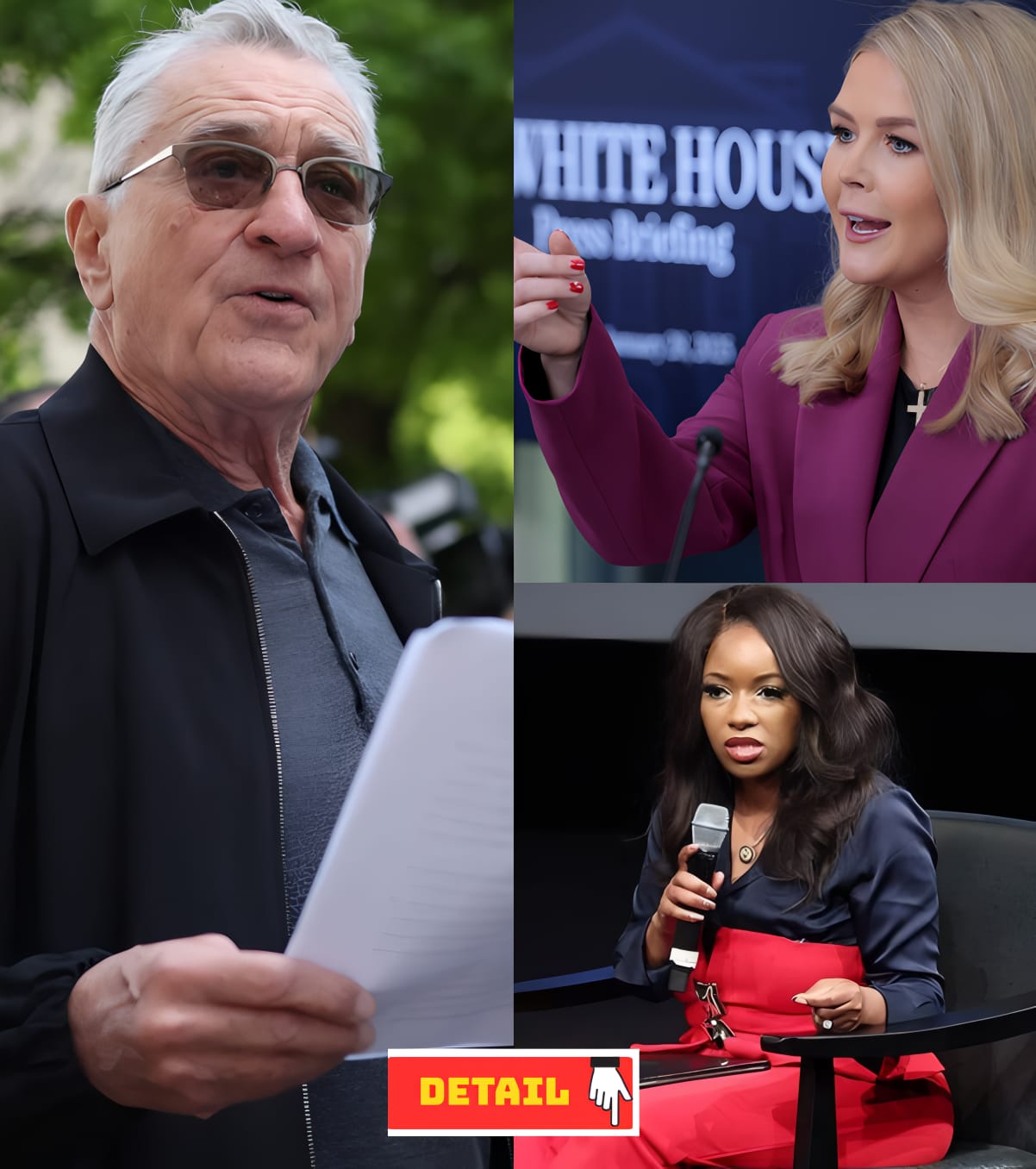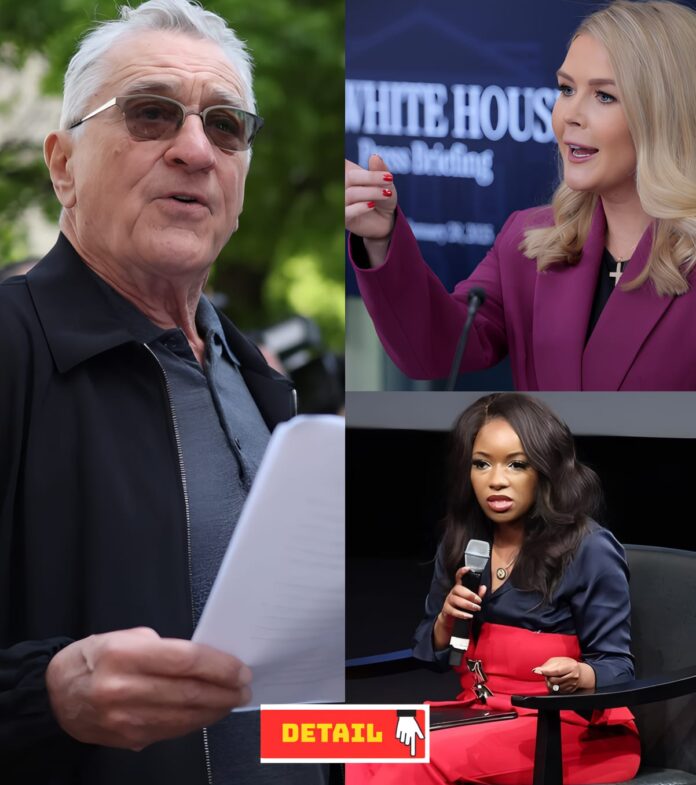🚨 SHOCKING ATTACK: Robert De Niro just slammed Karoline Leavitt, and the internet can’t stop talking about it! 💥
In a bold and controversial statement, De Niro claims that Leavitt isn’t qualified to be a role model for women. 😱 What sparked this heated response?
The fallout from this public clash is intense—and fans are taking sides! Could this feud change the future of public figures? 🧐🔥
What’s next for Karoline Leavitt? Will she defend her position or let De Niro’s words shape the conversation?

In a bold and unexpected move that has sent shockwaves through both Hollywood and political circles, legendary actor Robert De Niro has made a startling public statement about Karoline Leavitt, a rising political figure. In a comment that is being described as a shocking attack, De Niro declared that Leavitt is not qualified to be a role model for women, and his remarks have ignited a firestorm of debate across social media platforms.
A Sudden and Explosive Clash
Robert De Niro, who is known for his outspoken and often controversial views, didn’t hold back in a recent interview when asked about Leavitt’s rising political profile. Leavitt, a Republican, has made a name for herself as a former spokesperson for the Trump administration and a political commentator, and she has often positioned herself as a voice for women in the political arena. But De Niro, known for his liberal views, didn’t mince words when addressing her place in the public sphere.
In a moment that many are calling an “explosive attack,” De Niro didn’t hesitate to question Leavitt’s qualifications to be a role model for women, claiming that her political views and actions disqualified her from such a position. His comments were direct and unapologetic, and they have immediately stirred up a heated public debate about the role of women in politics, public life, and the expectations placed on them by society.
What Sparked De Niro’s Remarks?
The question on everyone’s mind is: What led to Robert De Niro’s sharp critique of Karoline Leavitt? While De Niro is known for speaking his mind, the timing of his comments adds another layer of intrigue. In recent months, Leavitt has been in the media spotlight, frequently making appearances on conservative platforms and advocating for what she believes to be the future of the Republican Party.
Leavitt’s rise has not been without its controversies. As a young woman in a male-dominated political field, she has often faced scrutiny for her outspoken opinions on issues ranging from feminism to immigration. Her unapologetic political stance has earned her both fervent supporters and vocal critics. Many conservative women have rallied around her as a symbol of empowerment, while her critics have argued that her views do not align with the broader movement of women fighting for equality.
It’s within this climate that De Niro made his pointed comments. As someone who has long been an advocate for progressive causes, De Niro’s statement may have been a reaction to what he perceives as an attempt to co-opt the feminist movement for conservative causes. His comment about Leavitt being “not qualified” to be a role model for women has sparked an immediate backlash, with both sides of the political spectrum weighing in on the controversy.
The Fallout: Public Reactions Explode
The reaction to De Niro’s remarks has been swift and intense. Fans, political commentators, and social media users have flooded online platforms to express their opinions. The response has been highly polarized, with many supporting De Niro’s critique, while others have defended Leavitt and accused the actor of unfairly targeting her.
Support for De Niro: A Champion of Progressive Values?
For many of De Niro’s fans, the actor’s criticism of Leavitt was a much-needed reminder of the importance of integrity in public life. Supporters of De Niro’s stance argue that Leavitt’s political views are deeply problematic and do not represent the values they believe women should embody. They argue that De Niro’s comment is not a personal attack on Leavitt, but rather a condemnation of the broader conservative agenda that she represents.
Some of De Niro’s admirers also pointed out that his career has been defined by roles in which he championed social justice and progressive causes. From his iconic films like Raging Bull to his outspoken political activism, De Niro has long been a voice of liberal values. His critics, they say, should not be surprised that he would take a stand against someone like Leavitt, who has consistently espoused views they see as harmful to women’s rights.
Defense of Karoline Leavitt: Standing Up for Women’s Voice in Politics
On the other side of the debate, Leavitt’s supporters have come to her defense, insisting that her qualifications as a role model for women are not for De Niro—or anyone else—to dictate. Leavitt’s rise as a young woman in politics has been nothing short of impressive, they argue, and she represents a new generation of women who are not afraid to speak out, challenge the status quo, and fight for what they believe in.
Leavitt’s defenders have also pointed out that the actor’s criticism reeks of hypocrisy. They argue that De Niro, who has made a career of speaking out against conservative figures and institutions, should not be the one to judge what constitutes a “qualified” role model for women. For many of Leavitt’s fans, this attack feels like an attempt to silence a woman who is speaking truth to power, and they have rallied behind her in solidarity.
The Role of Women in Politics: A Broader Conversation
At the heart of this public clash is a larger conversation about the role of women in politics and public life. In a time when women’s voices are more prominent than ever, the question of who gets to define what it means to be a “role model” for women is one that demands attention.
Leavitt’s critics argue that her political views are harmful to women and that she doesn’t embody the values that feminist movements have fought for. On the other hand, her supporters believe that she represents a diverse and evolving definition of womanhood in politics—a definition that includes conservative women who may not fit into the traditional progressive mold but are nonetheless advocating for their beliefs in meaningful ways.
De Niro’s comments have forced a reckoning on this issue. In critiquing Leavitt’s qualifications as a role model, he has inadvertently opened up a broader dialogue about how women are defined in the political world. Is there a single “correct” way to be a woman in politics, or do we need to embrace a more inclusive definition that allows for a diversity of voices and perspectives?
The Impact of Celebrity Opinions in Political Discourse
Another element of this debate is the role that celebrities play in shaping public opinion. While De Niro is an actor and not a politician, his words carry weight because of his fame and influence. In an era where social media allows celebrities to engage directly with their audiences, their opinions often carry more influence than those of traditional political figures.
The question now is whether De Niro’s attack on Leavitt will have any lasting impact on her political career. For some, the fact that a high-profile Hollywood figure has criticized her only strengthens her position as a fighter for women’s rights within the conservative movement. For others, it may be seen as a sign that the political battle lines are being drawn ever more sharply—and that figures like De Niro are taking no prisoners.
What’s Next for Karoline Leavitt?
For Leavitt, the next steps will be critical. How she responds to De Niro’s criticism could determine how the public views her moving forward. Will she take the high road, using De Niro’s words as an opportunity to reinforce her values and her political beliefs? Or will she choose to engage in the feud, turning the tables on De Niro and using his remarks to rally support for her cause?
Conclusion: The Aftermath of De Niro’s Shocking Remarks
Robert De Niro’s attack on Karoline Leavitt has stirred up a storm of controversy, exposing the deeply polarized nature of modern American politics. In his critique, De Niro not only questioned Leavitt’s qualifications but also raised broader questions about what it means to be a “role model” for women in the political arena. As the fallout continues to unfold, both De Niro and Leavitt will likely find themselves at the center of an ongoing debate about the intersection of politics, gender, and celebrity.
Whether De Niro’s remarks ultimately hurt Leavitt’s career or help her become a more prominent figure in the conservative movement remains to be seen. But one thing is certain: this public clash has sparked an important conversation that will continue to resonate across political and cultural lines.
